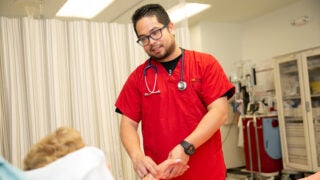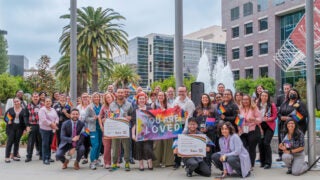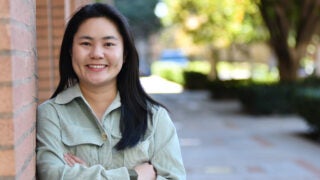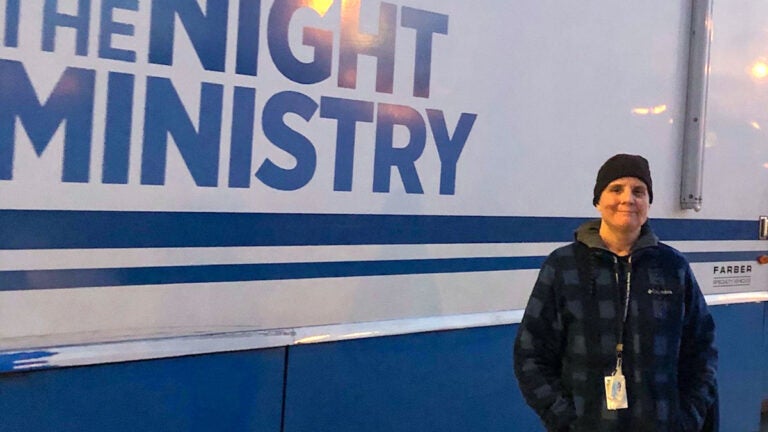
Nurse practitioner and USC grad Chandra Matteson provides basic health care, along with food and referrals to social services, to people experiencing homelessness and housing instability in Chicago. (Photo/Kathlyn Dino)
These skilled USC-trained nurse practitioners risk their health to help others
“It’s their finest hour.” Recent graduates of USC’s family nurse practitioner program help people with the greatest need face the threat of COVID-19.
Nurse practitioner Chandra Matteson starts every work shift by putting on an N95 respirator mask, gloves and safety goggles.
Then she heads outside to the cold and unforgiving streets of Chicago.
The USC alumna works with Night Ministry, a nonprofit that provides basic medical care, food and shelter to people experiencing homelessness or unstable housing. The coronavirus pandemic is a scary time for many of her patients, and not only because they worry about contracting COVID-19.
“Once you take all the people away from downtown Chicago, there’s nobody to hustle from,” Matteson said. “And if you don’t have anybody to hustle from, people start to get real desperate for food and to feed their habits.”
She travels the city in a medical outreach bus, stopping for an hour or two at a time. She hands out food, checks for coughs and fevers, delivers prescription refills and cleans cuts and scrapes. These are her patients, and she willingly cares for them, knowing the risks.
“I didn’t sign up to be part of a pandemic,” she said, “but I certainly signed up to help people.”
Matteson is one of many recent graduates from the USC Suzanne Dworak-Peck School of Social Work’s family nurse practitioner program whose professional lives have been upended by COVID-19. She finished her master’s degree in spring 2019 in the program’s second graduating class. Like many of her peers, she had no idea she’d be heading into a global viral outbreak a year later.
But nurse practitioners are proving critical in the fight against the new coronavirus, as ranks of physicians are stretched thin and demand for health workers explodes. In March, federal officials encouraged state leaders to lift restrictions on medical professionals like the country’s 290,000-plus nurse practitioners to help in the response to COVID-19.
And despite the risk to their own health and well-being, Matteson and many others continue to care for people in need. Others have found new ways to treat and support their patients, using video technology to limit the spread of the virus.
“It’s their finest hour,” said Sharon O’Neill, vice chair of USC’s Department of Nursing and director of the online family nurse practitioner program. “This is exactly what everybody trained for and what we were meant to do. It’s the reason most of us went into these professions.”
USC nursing graduates serve on front lines of COVID-19 response
As specially trained health workers, family nurse practitioners have advanced skills and are authorized to diagnose and treat medical conditions. Although many work in primary care settings like a doctor’s office, some nurse practitioners complete extra training in acute care to work in intensive care units — where patients with serious cases of COVID-19 fight for their lives.
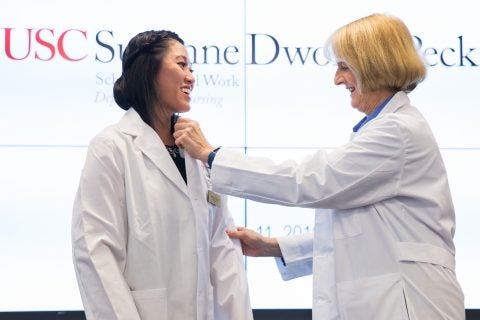
Those nurse practitioners trained in acute care “are on the front lines, dealing with patients who are ventilated,” O’Neill said. “They can intubate patients, put in chest tubes, things like that.”
Some USC graduates are stationed in an area of the emergency room called the fast track, where they manage patients as they arrive and determine what kind of care they need. As the coronavirus pandemic intensified, O’Neill said faculty members began talking with students about how to process what they witnessed in hospitals or clinics.
“It’s impacting every nurse,” she said, “whether you’re working in the ICU or on the hospital floor or in the clinic, along with all the other responders.”
That risk comes with the job, she said. Many USC-trained nurse practitioners embrace work on the front lines despite the coronavirus. Some program graduates recently traveled to New York, to help with the surge of COVID-19 cases there.
“I think they’re all heroes,” O’Neill said. “But when you’re in the middle of dealing with something like this — like when I was in the middle of the AIDS crisis and seeing patients because other nurses wouldn’t see them — you don’t think of yourself as a hero. You think of it as your job, what you’ve signed up for. It’s a privilege to take care of these people.”
Virtual health visits keep older adults safe during coronavirus pandemic
Nurse practitioner Sherry Jung’s patients are among those at greatest risk due to the COVID-19 outbreak. The 2019 USC graduate cares for older adults in assisted living and skilled nursing facilities who are eligible for Medicare. Their average age is 85.
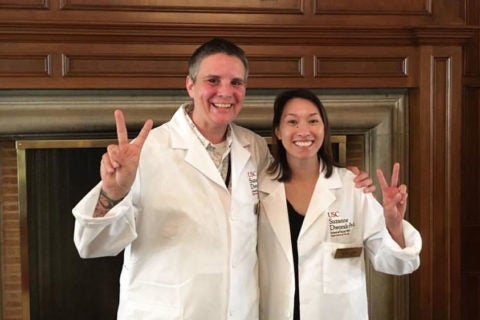
To protect their health as well as her own, she stopped seeing patients in person last month. Now she checks in through weekly video or phone calls.
“With them all being locked away from their families, it’s hard and lonely,” Jung said. “They say to me a lot, ‘I’m done being locked up in this place. I want to see my family again. I want to be able to not just FaceTime or call them but actually see and talk to them and touch them and hug them.’”
Jung watches after more than 50 patients in the Pasadena area through CareMore Health. By early March, she grew increasingly concerned about the threat of COVID-19 to her older clients. A week later, she only visited patients with urgent needs. Soon, even that stopped.
“It rolled out pretty fast,” she said. “We’ve moved to 100% virtual visits. It’s still really tricky, because some of us have patients with complicated wound care. If they are in a skilled nursing facility, they have nurses, but if it’s really complex, they don’t have that scope of practice. It has to be done by an outside provider.”
Isolation takes its toll on patients and nurse practitioners alike
As part of her effort to provide virtual care, Jung checks with the staff at each facility where she has a patient to see if they’ve experienced any positive COVID-19 cases or suspected symptoms. She encourages her patients to stay as isolated as possible and wash their hands regularly.
She misses seeing her clients in person, and they miss her, too. “But I tell them time and time again, I would feel so terrible if I contracted something and got them sick. That would end me, to know that I did that to them.”
Jung knows from personal experience how much social distancing hurts. She hasn’t visited her family since the onset of the pandemic in Southern California.
“My grandma says it almost every time I talk to her — she misses going out to lunch with me and seeing me,” she said. “Their biggest concern is my safety and making sure I’m staying healthy.
“And my biggest fear is for them.”
Despite health risks from COVID-19, nurse practitioner feels driven to serve others
Back in Chicago, as Matteson continues her in-person visits with the street medicine team, she takes extra precautions. Everybody wears face masks and gloves, and the health workers ask patients to stay a safe distance apart as they await care.
None of her usual clients has tested positive for COVID-19, she said. That makes her optimistic that the city’s population of people experiencing homelessness or unstable housing will ride out the pandemic. But she aches because she must keep her distance from them as much as possible. She built relationships with them for months through trust and compassion, so she’s frustrated.
Part of the reason I’m so driven to do this kind of work is the value of social justice instilled in me at USC.
Chandra Matteson
“We’re used to having a more personal touch with our clients, like hugging and making sure they are treated like human beings, basically,” she said. “None of that is happening right now.”
She sometimes visits patients in Chicago’s public transit system, which allows people to spend the night in train cars at one of its terminals, she said. Geared up in full-body jumpsuits, she and other health workers recently checked on patients who sought refuge on the train. For four hours, they took temperatures, treated wounds and other minor health complaints, and handed out sandwiches.
Although she boasts about her “superhuman immune system” that protected her for years as an emergency room nurse, Matteson admits she is concerned about her health during the COVID-19 pandemic. She just turned 50. It worries her to see other health care workers in hospitals contract the virus despite wearing much more protective gear than she dons each day.
But like many of her nurse practitioner colleagues, Matteson feels a duty to care for her patients.
“Part of the reason I’m so driven to do this kind of work is the value of social justice instilled in me at USC,” she said. “It embedded this need to go out and help people. It was already there, I think USC just encouraged it further.”

